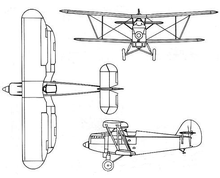Arado Ar 65
| Ar 65 | |
|---|---|

| |
| Role | Biplane fighter |
| Manufacturer | Arado |
| First flight | 1931 |
| Primary user | Luftwaffe |
| Produced | 1931-1936 |
| Number built | 85 |
The Arado Ar 65 was the single-seat biplane fighter successor to the Ar 64. Both looked very similar. The only major difference was the use of a 12-cylinder inline engine versus the Ar 64's radial. The wingspan was also increased.
The Ar 65 appeared in 1931 and six models were built. The first three 65a-c were prototypes, while the 65d-f were production models. The Ar 65d was delivered in 1933 and served alongside the Ar 64 in the two fighter groups - Fliegergruppe Döberitz and Fliegergruppe Damm. In 1935, the Ar 65 was reduced to a training aircraft. Production of the fighter was discontinued in 1936. However, the next year, 12 of them were presented to Germany's ally - the Royal Bulgarian Air Force. The final production total was 85 aircraft.
Variants
- Ar 65a
- Prototype, powered by a 559 kW (750 hp) BMW VI 7.3 12-cylinder water-cooled engine. First flight in 1931.
- Ar 65b
- Prototype, similar to the 65a but with minor structural changes.
- Ar 65c
- Prototype, similar to the 65b but with minor structural changes.
- Ar 65d
- Production model.
- Ar 65E
- Similar to the 65d, but with the removal of the vertical fuselage magazine of six 10 kg (22 lb) bombs.
- Ar 65F
- Final production model. Similar to the 65E.
Operators
Specifications (Ar 65E)

Data from Warplanes of the Third Reich[1]
General characteristics
- Crew: one
- Length: 8.4 m (27 ft 7 in)
- Wingspan: 11.2 m (36 ft 9 in)
- Height: 3.42 m (11 ft 3 in)
- Wing area: 23 m2 (250 sq ft)
- Empty weight: 1,510 kg (3,329 lb)
- Gross weight: 1,930 kg (4,255 lb)
- Fuel capacity: 218 L (58 US gal; 48 imp gal)
- Powerplant: 1 × BMW VI 7.3z V-12 liquid-cooled piston engine, 560 kW (750 hp) for take-off, 372.85 kW (500 hp) continuous maximum power (7.3:1 compression ratio)
Performance
- Maximum speed: 300 km/h (190 mph, 160 kn) at 1,650 m (5,413 ft)
- Cruise speed: 246 km/h (153 mph, 133 kn) at 1,400 m (4,593 ft)
- Range: 560 km (350 mi, 300 nmi)
- Service ceiling: 7,600 m (24,935 ft)
- Rate of climb: 10.60 m/s (2,086 ft/min)
- Time to altitude:
- 1,000 m (3,281 ft) in 1.5 minutes
- 5,000 m (16,404 ft) in 10.6 minutes
Armament
- Guns: 2 × 7.92 mm (.312 in) MG 17 machine guns with 500 rpg.
See also
Related development
Aircraft of comparable role, configuration, and era
Related lists
- List of Interwar military aircraft
- List of World War II military aircraft of Germany
- List of military aircraft of Germany
References
- ^ Green, William (1970). Warplanes of the Tthird Reich. New York: Doubleday & Company Inc. pp. 26–27. ISBN 0-385-05782-2.
- Green, William, and Gordon Swanborough, The Complete Book of Fighters (Salamander Books, 2002)
